When Matti Hagman debuted for the Boston Bruins on Oct. 7, 1976, he became the first Finnish-trained and Finnish-born player to play in the NHL. In a North American career that lasted four seasons, Hagman’s play would subsequently open the floodgates for Finland to offer up talented players to the league for decades to come.
But the 1980s were when Finnish players truly took off. They demonstrated that not only could they play alongside the best of the best in the NHL, but in many instances the Finns were the best of the best. By the end of the decade, three Finnish players would have their names inscribed onto the Stanley Cup. Four different Finns would be selected to play in at least one NHL All-Star Game during the 1980s, with one of them making six separate appearances.
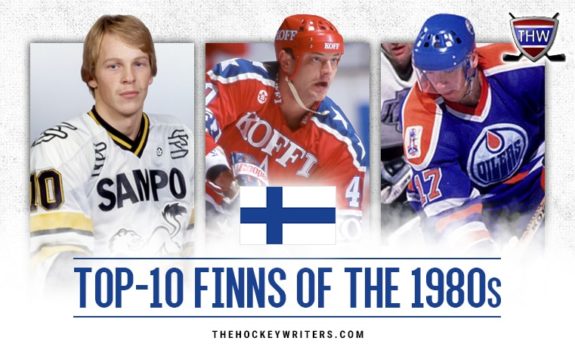
While Finland generated many greats who never skated in North America, in this instance we will be focusing on the players who made noticeable impacts on the NHL. Some of them lasted longer in the league than others, but each made an impression. One has his name forever enshrined in the Hockey Hall of Fame. A few others will forever be part of hockey lore. Without further adieu, THW presents to you the 10 best Finns to have played in the NHL during the 1980s:
#10 Pekka Rautakallio
Pekka Rautakallio’s time in the NHL was relatively brief, and he likely would have remained the best defender of the decade for the Calgary Flames if had he opted to play longer in North America. With the exception of the first three months of the 1979-80 season, his three total NHL seasons were all played in the 1980s. Previously having played from 1975 to 1977 with the old Phoenix Roadrunners of the World Hockey Association (WHA), Rautakallio returned to Finland for two seasons before making his NHL debut. Back in Finland he played for Ässät of the SM-liiga – presently referred to simply Liiga – colloquially known as the Finnish Elite League in English. Rautakallio was named Liiga’s Top Defenseman during both seasons, and the award itself is now known as the Pekka Rautakallio trophy.
Atlanta Flames General Manager Cliff Fletcher sought out Rautakallio and brought him back to North America in 1979. Signing with the Flames, the Finnish blueliner utilized his tremendous speed and powerful shot to generate five goals and 25 assists for 30 points in 79 games. His first season in the NHL would be the Flames final season in Atlanta.
After the team moved to Calgary, Rautakallio upped his offensive production in each of his remaining two seasons in the league. Enough so that he soon became recognized as one of the better defensemen in the NHL. Rautakallio’s 1980-81 season saw him score 11 goals and 45 assists for 56 points in 76 games. He helped the Flames to a long playoff run where they eventually lost in the semi-finals to the Minnesota North Stars. Playing in all 16 of their playoff games, Rautakallio added another two goals and four assists.
The 1981-82 NHL season would be Rautakallio’s finest. He set career highs in games played (80), goals (17), assists (51) and points (68). He finished third in scoring for Calgary, and finished in a three-way tie for fifth in NHL scoring by a defenseman along with Dave Babych and John Van Boxmeer. Most noteworthy though is the fact that Rautakallio’s performance that season would see him become the first Finnish player selected to play in the NHL All-Star Game.
1981-82 would also be Rautakallio’s last in the NHL. With his children beginning school, he wanted them to grow up in his homeland. Rautakallio returned to Finland and played through the 1986-87 season. Had his career been longer in the NHL, he likely would have been higher on our list.
#9 Mikko Mäkelä
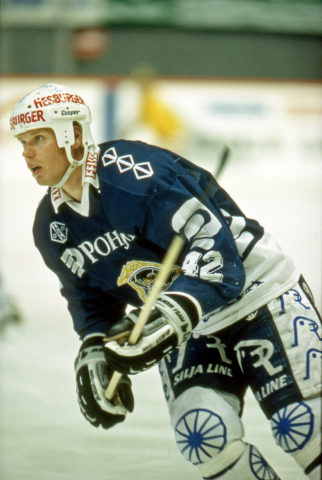
Mikko Mäkelä’s career began at a very interesting time for the New York Islanders. Household Islanders names like Mike Bossy, Bob Nystrom, Denis Potvin, Butch Goring and Billy Smith were seeing their careers coming to a close. The Islanders needed to prepare for their future success by bringing in younger talent like Pat LaFontaine and presumably Mäkelä. Though they remained a contending team for the rest of the 1980s, the recipe did not quite work.
The Islanders drafted Mäkelä in the fourth round of the 1983 Draft – the same draft that brought them LaFontaine. The Finnish left winger would score double digits in goals for his first four seasons. In his rookie season of 1985-86, Mäkelä scored 16 goals and 20 assists for 36 points in 58 games.
It was then that his talents began to come through on Long Island. During the 1986-87 season, Mäkelä’s 24 goals trailed only LaFontaine (38), Bossy (38) and Brent Sutter (27). Better yet was 1987-88, when other than LaFontaine, Mäkelä showed to be the Islanders best offensive player. He scored a career-high 36 goals in 73 games while adding on 40 assists to be better than a point-per-game player. 1987-88 would stand as the pinnacle season for Mikko Mäkelä.
As superb as that performance may have been, Mäkelä could not sustain those numbers. 1988-89 would see him score just 17 times and he would never score higher than that in his remaining three NHL seasons. As the 1990s came around, Mäkelä bounced around between the Los Angeles Kings, Buffalo Sabres and Boston Bruins.
To his credit though, his first four seasons – all played in the 1980s – were rather above average. In 287 games from 1985-86 through 1988-89, Mäkelä scored 93 goals and 121 assists for 214 points. Were it not for those totals, he may not have made our list. Both the ninth and 10th spots were closely contended between Mäkelä and Rautakallio.
#8 Hannu Virta
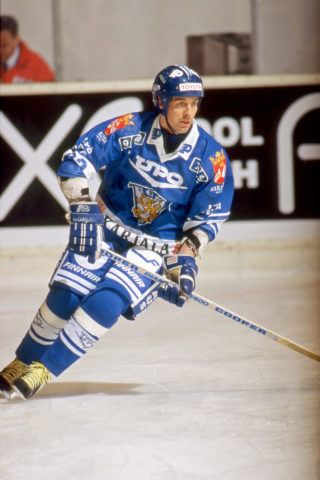
The Buffalo Sabres drafted defenseman Hannu Virta with the 38th pick of the 1981 NHL Draft. He would make his NHL debut on Mar. 30, 1982 against the Quebec Nordiques. Completing the tail end of the 1981-82 season with Buffalo – including the playoffs – Virta would become a mainstay on the Sabres’ blue line for four more seasons.
At roughly 6-feet and 180 pounds, Virta was nothing special in terms of his size on defense. He was however tremendous with his puck control and his decision making. It was those qualities that endeared him to Sabres GM and head coach, the legendary Scotty Bowman. Enough so that Virta would play seasons of 74, 70, 51 and 47 games respectively between 1982-83 and 1985-86.
Virta’s finest season was his full rookie season of 1982-83. Playing in 74 games, he generated 13 goals and 24 assists for 37 points. Those numbers were good enough for third place in scoring among the Sabres defense corps, finishing behind only Phil Housley and Mike Ramsey. Virta played in all 10 playoff games for Buffalo that season too, as the Sabres lost in seven games to the Boston Bruins in the second round.
In his four full seasons with the Sabres, Virta never had less than 23 assists in each season. In 245 NHL games – all with the Sabres – he scored 25 goals and 101 assists for 126 points. Though he may not have achieved NHL All-Star status or garnered any hardware during his time in the league, he remained a steadfast blueliner for Buffalo for the first half of the 1980s.
Virta would eventually be called for military service in his homeland. Returning to Finland, he would wrap up his career with nine seasons in Liiga as well as two seasons in Switzerland. He would win a bronze medal for his country at the 1994 Lillehammer Winter Olympics.
#7 Christian Ruuttu
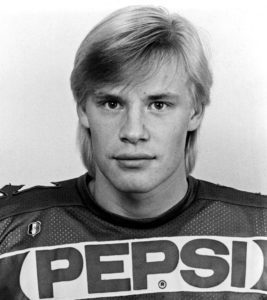
Christian Ruuttu could be considered as the proverbial “diamond in the rough”. The sleek centerman was not drafted until the seventh round of the 1983 NHL Draft. He would ultimately be utilized as one of the Buffalo Sabres top-2 centers for the second half of the 1980s but his stock would eventually drop. For the first few seasons of his career though, Ruuttu generated offense that was badly needed on some woeful Sabres teams.
Ruuttu would make his NHL debut in 1986-87. With the retirement of Sabres legend Gilbert Perreault early in the season, Buffalo needed one of their young centers to step up his game. The rookie Ruuttu was able to do that to some extent. He would score 22 goals and 43 assists for 65 points in 76 games – good enough for third on the team in scoring.
The following season Ruuttu would achieve career highs in goals (26) and points (71) in 73 games. His 71 points were good enough to be second on the Sabres in scoring that season behind Hockey Hall of Famer Dave Andreychuk. Ruuttu’s performance gained notice throughout the league, and he was selected to represent the Sabres and the Wales Conference at the 1988 NHL-All Star Game in St. Louis – the only All-Star Game appearance of his career.
Ruuttu finished out the rest of the decade as a Sabre and remained with the team up through the 1991-92 season. He would be traded to the Chicago Blackhawks in June 1992 for Stephane Beauregard, in a deal that ultimately would be responsible for bringing Dominik Hasek to the Sabres later that summer. Ruuttu wrapped up the final three seasons of his NHL career in Chicago and Vancouver.
What ultimately led to Ruuttu being on our list was the early production in his career in the 1980s. From the 1986-87 season through 1989-90, he scored 81 goals and 175 assists. To generate a total of 256 points in 291 games are very decent totals, particularly for a seventh-round selection.
#6 Risto Siltanen
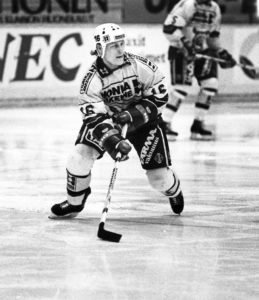
Risto Siltanen was a talented offensive-defenseman who could have ranked even higher on our list if he had not been a victim of circumstance. At only 5-foot-7 and 180 pounds soaking wet, Siltanen had a low center of gravity and was exceptionally difficult to move off of the puck. His teammates took to calling him “The Littlest Hulk” due his diminutive stature but great strength.
Though he was originally a late draft selection of the St. Louis Blues in 1978, Siltanen would make his professional debut in North America in the WHA for the Edmonton Oilers. When the Oilers merged into the NHL in 1979, he would be reclaimed by the Blues. Later that summer, the Blues would actually send Siltanen back to Edmonton along with Tom Roulston in exchange for Joe Micheletti. Siltanen would remain with the Oilers through their first three NHL seasons and became one of the team’s better defensemen.
Subsequently, Siltanen’s production totals went up each season with the high-flying Oilers. After scoring six goal and 29 assists in 64 games in the 1979-80 season, he upped those numbers to 17 goals, 36 assists and 53 points in 79 games during the 1980-81 season.
Siltanen would truly take off offensively in 1981-82. While his teammate Wayne Gretzky set an NHL record with 92 goals that season, the fireplug defenseman ended up being a point-per-game player. Siltanen scored 15 goals and 48 assists for 63 points in 63 games. The only Oilers defenseman to outscore him that year was Paul Coffey.
As fate would have it though, Siltanen would be traded to the Hartford Whalers right before the Oilers would go on a reign of greatness. Edmonton shipped Siltanen and Brent Loney to the Whalers before the start of the 1982-83 season in exchange for Ken “The Rat” Linseman. While Siltanen continued to generate offense with the Whalers, Linseman was instrumental in bringing the Oilers their first Stanley Cup in 1984.
Siltanen would play three-and-a-half seasons in Hartford, before finishing out his career with a little more than a season in Quebec. He would return to Europe after the 1986-87 NHL season. Siltanen finished up with 90 goals, 265 assists and 355 points in 562 games. One cannot help but think “what might have been” had Siltanen remained in Edmonton. The likelihood is that he would have gotten his name on the Cup at least once. Had he done so, Siltanen would have been within the top-5 on our list.
#5 Petri Skriko
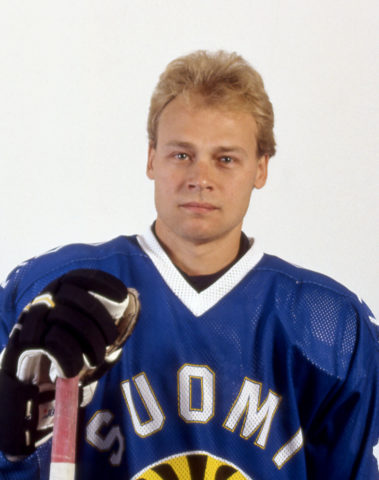
Following two successful World Junior Championships when he helped his country to a silver (1981) and a bronze (1982), Petri Skriko became the first Finnish player in Vancouver Canucks history. The Canucks selected him with the 157th pick of the 1981 NHL Entry Draft. Skriko would not disappoint.
Making his debut in the 1984-85 season, he proceeded to score 21 goals in 72 games as an NHL rookie. Skriko would follow that up with four straight seasons of at least 30 goals. He was the Canucks leading scorer for both the 1985-86 and 1988-89 seasons. Skriko would set career highs during the 1985-86 campaign when he totaled 38 goals and 40 assists for 78 points in 80 games.
A second 30-goal and 70-point season – 33 goals and 74 points to exact – would follow in the 1986-87 season. A crafty skater and playmaker, such performances by Skriko would see him be named the NHL Player of the Month in November 1986 – the first time that a Vancouver Canuck would receive the accolade. Through seven-and-a-half seasons for Vancouver – most of which were played during the 1980s – Skriko scored 171 goals and 202 assists for 373 points in 472 games. Skriko still ranks fifth in Canucks history with career shorthanded goals (11) and is tied for fifth in career hat-tricks (5).
With his numbers declining as the decade came to a close, the Canucks shipped Skriko to the Boston Bruins on Jan. 16, 1991 in exchange for a second-round draft pick. Additional stops included the Winnipeg Jets and the San Jose Sharks, but Skriko never rekindled the scoring touch that he generated throughout most of the 1980s.
#4 Ilkka Sinisalo
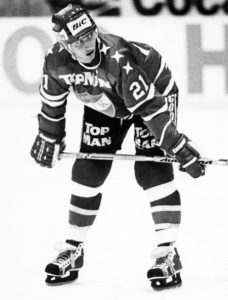
While the Philadelphia Flyers have long been classified by their renowned toughness, they have likewise always maintained some level of gracefulness on their roster for decades. During the 1980s, winger Ilkka Sinisalo provided that grace. Throughout the decade he was arguably the Flyers most skillful player.
Surprisingly, Sinisalo was never drafted. It was not until NHL teams started scouting Finland more routinely that he was discovered. The Flyers signed Sinisalo as a free agent on Valentine’s Day of 1981. Making his debut during the 1981-82 season, his goal production increased across five straight seasons. As a rookie, Sinisalo scored 15 goals and 22 assists for 37 points in 66 games. He would follow that up with seasons of 21, 29, 36 and 39 goals respectively. Oddly enough, Sinisalo scored his first NHL goal on a penalty-shot when he did so against Pittsburgh Penguins goalie Paul Harrison on Oct. 11, 1981.
While he never won a Stanley Cup, Sinisalo helped the Flyers to the Stanley Cup Final in both the 1984-85 and 1986-87 seasons. He remained with the team through the 1989-90 season. In total, Sinisalo played 526 games for Philadelphia, scoring 199 goals, 210 assists and 409 points. He would finish his career with brief stays in the early-1990s with the Minnesota North Stars and Los Angeles Kings.
Very sadly, we lost Sinisalo on Apr. 5, 2017 to prostate cancer. The Flyers community mourned his passing especially.
#3 Esa Tikkanen
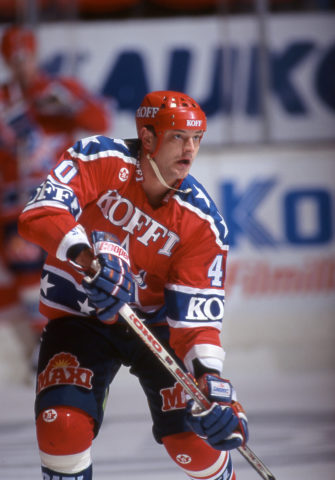
Esa Tikkanen was the first player to demonstrate that Finns were capable of playing a gritty, agitating style and did not shy away from physical play. Tikkanen was the type of player that other players absolutely hated going up against but loved having on their team. Out on the ice and from the bench, he drove opposing players nuts – and sometimes his own teammates – with his continuous, self-created Finnish-English dialogue that came to be known as “Tikkanese” or “Tiki-Talk”.
While Tikkanen’s antics made him both a pest and somewhat of an oddity, make no mistake – he possessed a great deal of God-given talent.
The Edmonton Oilers made Tikkanen the 80th overall choice of the 1983 NHL Draft. Playing two seasons for Liiga’s HIFK, he would make his first NHL appearance at the most fortunate time. With the Oilers making their second straight run at a Stanley Cup, Tikkanen debuted in Game Two of the 1985 Stanley Cup Final against the Philadelphia Flyers. Also playing in Games Three and Four, he would get his name inscribed on the Stanley Cup without yet having played a regular season game. The Oilers would defeat the Flyers for the Cup, winning the series four games to one.
Tikkanen would remain a permanent fixture for the Oilers from that point forward. He would play 35 regular season games during the 1985-86 season, plus eight more in the playoffs. Tikkanen’s first full NHL season came in 1986-87. That season saw him most oftentimes playing on a line with Wayne Gretzky and fellow countryman Jari Kurri. He would subsequently finish fourth in scoring for the Oilers while playing 76 games. That season Tikkanen set a career high in goals (34) and points (78). He would later equal that same point total during the 1988-89 season.
From 1986-87 through 1989-90, Tikkanen scored at least 30 goals in three of the four seasons. He never scored less than 23 within that time either. True to his character, he also posted penalty-minute totals of 120, 153, 92 and 161 in each of those respective seasons. Most importantly however, Tikkanen won four Stanley Cups with Edmonton – 1985, 1987, 1988 and a fourth in 1990.
By the time his career ended, he would add a fifth Stanley Cup ring with the New York Rangers in 1994. Tikkanen’s final NHL season came at the conclusion of 1998-99 – his third stint with the Rangers. He would also have stops with the St. Louis Blues, New Jersey Devils, Vancouver Canucks, Florida Panthers, and Washington Capitals. Tikkanen finished his career having scored 244 goals, 386 assists and 630 points in 877 regular season games.
Winning three Stanley Cups in the 1980s is why Tikkanen places third on our list.
#2 Reijo Ruotsalainen
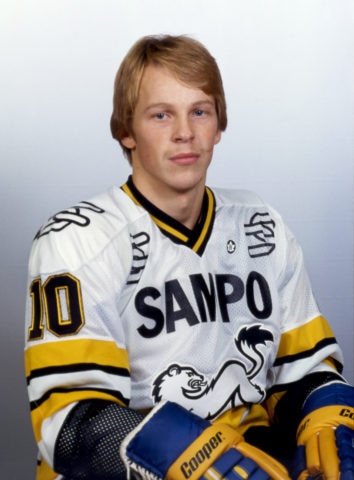
As diminutive as Reijo Ruotsalainen may have been at 5-foot-8 and 165 pounds, he was easily the best skater of our group. “Miracle On Ice” coach Herb Brooks – who coached Ruotsalainen with the New York Rangers – considered the Finn to be the best skater in the NHL, period.
The Rangers selected Ruotsalainen with the 119th pick of the 1980 NHL Draft. Earlier that January he had helped the Finns win the silver medal at 1980 World Junior Championship. Scoring four goals and three assists in only five games, Ruotsalainen was named Best Defender for the tournament and a Media All-Star.
Ruotsalainen would come Stateside where he would score 18 goals and 38 assists for 56 points in 78 games as a Rangers rookie – the most in all three offensive categories for New York defensemen that season. He continued to be the top-scoring Rangers blueliner for five more seasons after that. During the 1984-85 season, Ruotsalainen led not only their D-men but all Rangers in scoring with 28 goals 45 assists and 73 points in 80 games. Those were the highest totals for goals and assists among all Rangers too. During his final season with the Rangers – 1985-86 – he was selected to play in his first and only NHL All-Star Game.
Ruotsalainen was traded to the Edmonton Oilers on Oct. 23, 1986 as part of a seven-player deal. Initially without a contract in place when the 1986-87 season started, he opted to play in Switzerland for SC Bern. Eventually Ruotsalainen and the Oilers worked out a deal , and he would finish out the season back in the NHL with five goals and eight assists for 13 points in just 16 regular season games. More importantly though, Ruotsalainen played in all 21 games that postseason for the Oilers as they won their third Stanley Cup. He became the third Finnish player to have his name inscribed on Lord Stanley’s chalice.
The remainder of the 1980s saw Ruotsalainen play primarily in Europe. He would however return to the NHL for the 1989-90 season with the New Jersey Devils, who had earlier claimed him on Oct. 5, 1987 in the NHL Waiver Draft. After playing 31 games for the Devils, he would be traded back to Edmonton at the 1990 NHL trade deadline. Now back with the Oilers, Ruotsalainen would win his second Stanley Cup – the Oilers’ fifth.
Though he would play up through the 1997-98 season, the 1989-90 campaign was Ruotsalainen’s last one in the NHL. In 446 games, he scored 107 goals and 237 assists for 344 points while winning the two Stanley Cups.
#1 Jari Kurri
There should be no surprise that the great Jari Kurri is the top player on our list. No Finn was more dominate throughout the 1980s than he was. While Kurri’s career continued far into the 1990s, it was in the earlier decade where he provided the most magic.
The Edmonton Oilers drafted him in the fourth round of the 1980 Draft. From Kurri’s rookie performance of 1980-81 up through the rest of the decade he remained a point-per-game player in each season. In Kurri’s first season he scored 32 goals and 43 assists for 75 points in 75 games. He never scored less than 32 goals in a season for the remainder of the 1980s, and in most instances he dramatically increased that production.
With Kurri combined with Wayne Gretzky at center, the duo became the Rodgers and Hammerstein of hockey. Kurri’s highest offensive output came during the 1984-85 season when he scored a staggering 71 goals in 73 games. Adding his 64 assists onto that total, he finished with a career high of 135 points. Kurri would follow that up with 68 goals and 131 points in the 1985-86 season. Those 68 goals were the most of any NHL player that season.
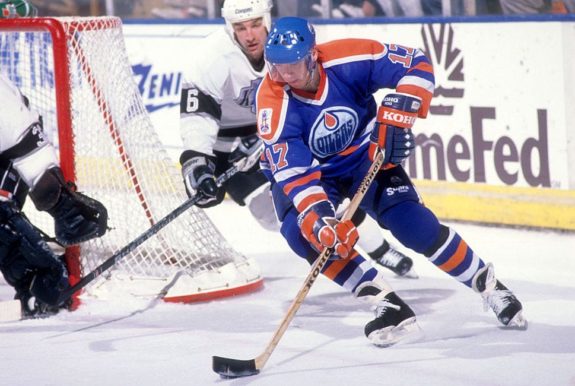
From 1980-81 through 1988-89, he would score 441 goals and 950 points in only 676 regular season games. He would be named to the NHL’s First All-Star Team in 1985 and 1987, and the Second All-Star Team in 1984, 1986 and 1989. Kurri would play in six NHL All-Star Games during the decade. Most importantly, Kurri helped the Oilers win the Stanley Cup in 1984, 1985, 1987 and 1988 (he would add a fifth Stanley Cup to his career in 1990).
After the 1980s, Kurri would have stops with the Los Angeles Kings, New York Rangers, Mighty Ducks of Anaheim and Colorado Avalanche. He would retire as a player following the 1997-98 NHL season. At the end of his incredible career, he had scored 601 goals, 797 assists, and 1,398 points in 1,251 regular season games – the majority of those goals and points of course coming during the 1980s. Kurri would receive induction into the Hockey Hall of Fame in 2001, and was the first Finn to receive the honor.
By no means should Kurri be seeded anywhere else on this list other than at number-1.
The Honorable Mentions:
We recognize that not all of the great Finnish players of the 1980s played in the NHL, or if they did, they may not have had the longest stay. We would like to discuss a few Finnish players who had tremendous careers both in international play and in the SM-liiga. While these players may not have been household names in North America, they certainly were in their homeland.
Esa Keskinen was drafted 101st overall in the 1985 NHL Draft by the Calgary Flames, but he would never play an NHL game. Rather, he proceeded to win a silver medal for Finland at the 1988 Calgary Winter Olympics and then a bronze in 1994 at Lillehammer. Keskinen scored the most points (20) – in only seven games – and had the most assists (14) at the 1986 World Junior Championship, outscoring players such as Michal Pivonka, Brian Bradley, Adam Creighton, and teammate Esa Tikkanen.
Sticking with the 1980s, Keskinen played in Liiga for TPS from 1983-84 through 1987-88, then finished out the decade as a member of Lukko. His 25 assists and 35 points in 31 games were the most among all Liiga rookies during the 1983-84 season. Keskinen ended his career with 215 goals and 443 assists for 658 points in only 478 Liiga games. As if that were not enough, during his time played in the Swedish Elite League he scored an additional 61 goals, 148 assists and 209 points in 203 games.
Raimo Helminen played parts of three NHL seasons in the 1980s after he was selected with the 35th pick of 1984 NHL Draft by the New York Rangers. There was no real surprise that he was drafted, and he likely could have selected higher. Helminen absolutely owned the 1984 World Junior Championship. In seven games he scored a whopping 11 goals and 13 assists for 24 points – the highest totals for all three categories at that particular tournament. Helminen was named Best Forward and was a member of the WJC All-Star Team.
While his NHL stops with the Rangers, Minnesota North Stars, and and New York Islanders amounted to a mere 13 goals, 46 assists and 59 points in 117 games, his Liiga totals ended up being 161 goals, 420 assists and 581 points in 751 games. Helminen won one Olympic silver and two Olympic bronze medals for Finland, along with six different World Championship medals – one gold, four silver and one bronze.
One final honorable mention to include is Arto Javanainen. While he never won an Olympic medal or World Championship medal, he is the most prolific goal scorer in the history of Liiga. He was drafted twice by an NHL team – first in the sixth round of the 1983 Draft by the Montreal Canadiens, and then again in the fifth round in 1984 by the Pittsburgh Penguins. Javanainen began his career with Ässät during the 1975-76 season. Spending time later in his career with TPS as well – and with the exception of the 1984-85 season – he was a star player for Liiga up through the 1993-94.
The 1984-85 campaign would be Javaninen’s lone season in North America. Spending the bulk of the time with the AHL’s Baltimore Skipjacks, he would also play 14 games for the Penguins where he would score four goals and one assist. In his 668 games played in Liiga, Javainen scored an astounding 462 goals – no other player in the history of the league has scored more than 300. Adding 330 assists onto his totals, he would finish his Liiga career with 792 points for the second-highest point total in the league’s history.